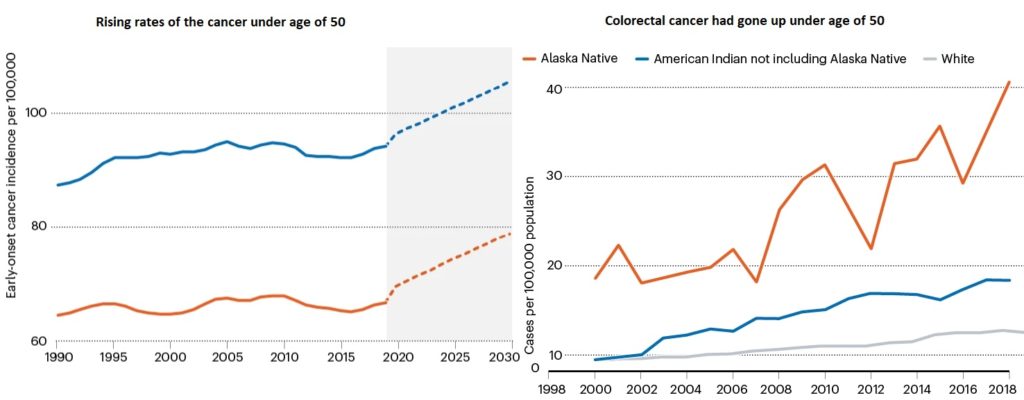
- Oncologists Cathy Eng and George Barreto have observed a concerning trend: an increasing number of young adults are being diagnosed with cancers typically seen in older individuals.
- This rise in early-onset cancer rates varies across countries and cancer types, with colorectal, pancreatic, stomach, breast, and prostate cancers among those showing significant increases.
- Factors like rising obesity rates, dietary changes, and genetic predispositions have been considered but don’t fully explain the trend.
- Efforts for earlier screening and awareness campaigns are underway, with some groups advocating for screenings to start at younger ages, such as 45 instead of 50 for colorectal cancer.
- Genetics and the microbiome are being explored for potential links to early-onset cancers, but clear associations remain elusive.
- Challenges exist in collecting comprehensive data across countries and ethnic groups, hindering efforts to understand the causes and develop effective prevention strategies.
- Longitudinal studies starting from prenatal stages are deemed crucial for understanding the complex interplay of environmental and genetic factors in cancer development.
- Treatment of early-onset cancers poses unique challenges, including concerns about fertility, long-term side effects, and socioeconomic impacts.
In the medical realm, an unsettling pattern has emerged: a surge in young adults grappling with cancers typically associated with aging populations. Oncologists Cathy Eng and George Barreto have been among the first to witness this concerning trend firsthand. They’ve encountered a stream of young patients like a 16-year-old girl from China, forced to confront gastrointestinal cancer—a disease usually found in individuals’ decades her senior. This phenomenon is not isolated; it’s a global issue.
The statistics are stark. Across numerous countries, colorectal, pancreatic, stomach, breast, and prostate cancers are on the rise among adults under 50. Despite efforts to pinpoint causes such as obesity and dietary changes, the full explanation remains elusive. The urgency for early detection has prompted calls for revised screening protocols and heightened awareness campaigns. For instance, in the United States, the recommended age for colorectal cancer screenings has been lowered to 45.
Yet, unraveling the mystery of early-onset cancers proves complex. While genetics and the gut microbiome are under scrutiny, definitive links evade researchers. Compounding the challenge is the need for comprehensive data spanning various ethnicities and regions. Without such breadth, understanding the roots of this epidemic remains elusive.
Addressing this crisis extends beyond diagnosis and treatment. Longitudinal studies, starting even from prenatal stages, are deemed essential. These investigations aim to dissect the intricate interplay of genetic predispositions and environmental exposures over time.
Navigating cancer treatment in younger patients presents distinct challenges. Considerations of fertility preservation, long-term side effects, and socioeconomic impacts are paramount. Candace Henley’s experience, diagnosed with colorectal cancer at 35, epitomizes these struggles. Her journey underscores the need for holistic support systems tailored to the unique needs of young cancer patients. In the quest for answers, collaboration is key. Advocates like Barreto stress the importance of global data repositories. Without these resources, we risk failing future generations. As the medical community grapples with this crisis, one thing is clear: early detection, informed by robust research, is our best defense against the rising tide of early-onset cancers. https://www.nature.com/articles/d41586-024-00720-6
